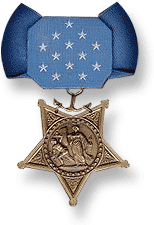Kenneth A. Walsh
| Kenneth Ambrose Walsh | |
|---|---|
  Kenneth A. Walsh, Medal of Honor recipient | |
| Born |
November 24, 1916 Brooklyn, New York |
| Died | July 30, 1998 (aged 81) |
| Place of burial | Arlington National Cemetery |
| Allegiance | United States of America |
| Service/branch | United States Marine Corps |
| Years of service | 1933–1962 |
| Rank | Lieutenant Colonel |
| Unit | VMF-124 |
| Battles/wars |
World War II, Pacific Theater Korean War |
| Awards |
Medal of Honor Distinguished Flying Cross with 6 Gold Stars |
Kenneth Ambrose Walsh (November 24, 1916 – July 30, 1998) was the fourth ranking United States Marine Corps fighter ace in World War II with a record of 21 enemy planes destroyed.
Biography
.jpg)
Born and raised in Brooklyn, New York, Walsh enlisted in the Marines on December 15, 1933, at age 17, becoming a mechanic and radioman. Upon receiving his Wings of Gold in April 1937 he was still a private, but was promoted to corporal soon thereafter. He flew scout-observation aircraft over the next four years before assignment to VMF-121 in North Carolina. At the time of the attack on Pearl Harbor, he was a technical sergeant, becoming a warrant officer in May 1942, and was commissioned a year later. He was also one of a handful of Marine aviators qualified as an aircraft carrier landing signal officer.
Assigned to VMF-124, Walsh was one of the most experienced pilots in the Corps' first Vought F4U Corsair squadron. The unit arrived at Guadalcanal in February 1943 and was immediately committed to combat. He claimed his first three Japanese planes on April 1, 1943 and two more in his next combat, May 13, 1943, becoming the first Corsair ace.
Walsh brought his score to 20 by the end of August 1943, including two combats[1] over the Solomon Islands that earned him the Medal of Honor. US President Franklin D. Roosevelt presented him the medal on February 8, 1944.
Walsh returned to combat in 1945, flying with VMF-222, scoring his last kill at Okinawa on June 22, 1945.
Walsh remained in the Marine Corps for a full career, flying transports in Korea and retiring as a lieutenant colonel in February 1962. He was a frequent participant in history seminars and often assisted researchers and historians interested in the Pacific War.
He died at age 81 from a heart attack. He left a widow, Beaulah and a son. LtCol Walsh was buried at Arlington National Cemetery.
Medal of Honor citation
Rank and organization: First Lieutenant, pilot in Marine Fighting Squadron 124, U.S. Marine Corps. Place and date: Solomon Islands area, 15 and 30 August 1943. Entered service at: New York. Born: 24 November 1916, Brooklyn, N.Y. Other Navy awards: 4 Distinguished Flying Crosses with 5 Gold Stars.
Citation:
For extraordinary heroism and intrepidity above and beyond the call of duty as a pilot in Marine Fighting Squadron 124 in aerial combat against enemy Japanese forces in the Solomon Islands area. Determined to thwart the enemy's attempt to bomb Allied ground forces and shipping at Vella Lavella on 15 August 1943, 1st Lt. Walsh repeatedly dived his plane into an enemy formation outnumbering his own division 6 to 1 and, although his plane was hit numerous times, shot down 2 Japanese dive bombers and 1 fighter. After developing engine trouble on 30 August during a vital escort mission, 1st Lt. Walsh landed his mechanically disabled plane at Munda, quickly replaced it with another, and proceeded to rejoin his flight over Kahili. Separated from his escort group when he encountered approximately 50 Japanese Zeros, he unhesitatingly attacked, striking with relentless fury in his lone battle against a powerful force. He destroyed 4 hostile fighters before cannon shellfire forced him to make a dead-stick landing off Vella Lavella where he was later picked up. His valiant leadership and his daring skill as a flier served as a source of confidence and inspiration to his fellow pilots and reflect the highest credit upon the U.S. Naval Service.[2]
See also
Notes
- ↑ Walsh's memorable actions on the second of those actions, on 30 August, are documented in Edward H. Sims' book Greatest Fighter Missions, as the fifth chapter of that compilation.
- ↑ "Medal of Honor recipients". World War II (T – Z). United States Army Center of Military History. June 8, 2009. Retrieved June 8, 2009.
References
- Barrett Tillman (1979). Corsair: The F4U in World War II and Korea. Naval Institute Press, Annapolis
- Frank Olynyk (1995). Stars & Bars: A Tribute to the American Fighter Ace 1920–1973. Grub Street, London
- "Kenneth Ambrose Walsh, Lieutenant Colonel, United States Marine Corps, Arlington National Cemetery profile. (Retrieved on 2006-07-15)". Retrieved September 29, 2010.
Further reading
- Jordan, Kenneth N. (August 1997). Men of Honor: Thirty-Eight Highly Decorated Marines of World War Ii, Korea, and Vietnam. A Schiffer Military History Book. Schiffer Aviation History. ISBN 978-0-7643-0247-3. NB: Includes profile of Kenneth Walsh.
External links
- "Kenneth A. Walsh". Claim to Fame: Medal of Honor recipients. Find a Grave. September 10, 2001. Retrieved September 7, 2010.
- "Kenneth A. Walsh". Hall of Valor. Military Times. Retrieved September 7, 2010.
- "Lieutenant Colonel Kenneth Ambrose Walsh, USMC, Who's Who in Marine Corps History, History Division, United States Marine Corps. Retrieved on 2006-07-15". Retrieved September 29, 2010.
- Mersky, Commander Peter B. Time of the Aces: Marine Pilots in the Solomons, Marines in World War II Commemorative Series, Marine Corps History and Museums Division, United States Marine Corps, 1993. (Retrieved on 2006-07-15)